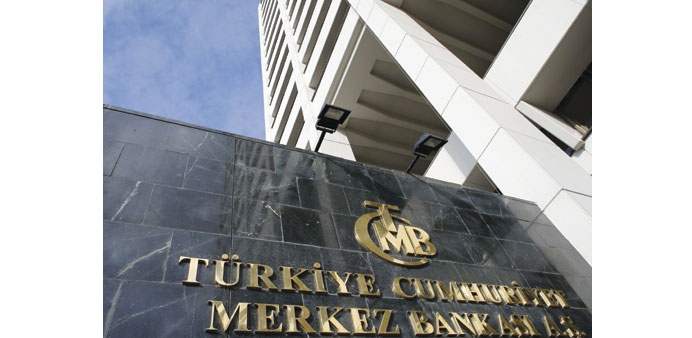Turkey’s central bank said it would keep policy tight until there is a clear improvement in the inflation outlook, however, suggesting the cut at the upper end of its corridor of interest rates was a token gesture amid rising inflation expectations
Reuters
Turkey’s central bank unexpectedly lowered its overnight lending rate yesterday, in a move seen as having little easing impact and more as a signal to a government keen for rate cuts that it is supporting the economy.
The bank said it would keep policy tight until there is a clear improvement in the inflation outlook, however, suggesting the cut at the upper end of its corridor of interest rates was a token gesture amid rising inflation expectations.
The bank cut the overnight lending rate to 11.25% from 12% and the overnight borrowing rate for primary dealers to 10.75%. None of the 20 economists polled by Reuters had forecast a change in the overnight lending rate or the primary dealer rate.
It left other rates including its benchmark 8.25% weekly repo rate on hold, as expected by most economists.
“The rates which have been lowered have no policy impact because they are not being used regularly. But cutting them possibly works as a signal to the government that the central bank is supporting the slowing economy,” said Tatha Ghose, analyst at Commerzbank.
Banks are mostly funded through the one-week repo rate and the average cost of funding is now at 8.3% - well below the overnight borrowing rate.
Given the worsening economic outlook, however, Ghose said a cut in the bank’s main one-week policy rate could soon follow.
“They will look for future opportunities to lower the policy rate. The economy is slowing; only the bad inflation data meant this wasn’t the opportune time,” he said.
The government of Prime Minister Tayyip Erdogan, who was elected president this month, has been urging the central bank to lower rates ever since an emerging market sell-off in January forced it to almost double them at a midnight meeting.
Erdogan takes the view that high rates in fact cause inflation. Economy Minister Nihat Zeybekci told Reuters a day after Erdogan’s presidential election victory that the government would continue to seek lower rates.
But the central bank said this month that the year-end inflation forecasts in its monthly survey had risen to 8.7% from 8.3% previously.
The bank, whose own forecast for 2014 inflation is 7.6%, said high food prices were delaying improvements in the outlook for prices.
“Turkey’s central bank is still trying to sound hawkish while trimming its interest rates,” said Nicholas Spiro, Managing Director Spiro Sovereign Strategy in London.
“This is a central bank that has got its policy of sending contradictory signals down to a fine art, which adds to the lack of transparency and loss of credibility in Turkish monetary policy.”
The central bank said that it wanted to keep short-term rates in a more symmetrical interest rate corridor, which some analysts said could reduce uncertainty for banks.
But analysts also said that despite the overnight lending and overnight borrowing rates for primary dealers being seldom used, cutting them reduces the bank’s ability to tighten policy quickly by lowering the amount of money available at the one-week repo rate and forcing banks to use the upper bands.
Istanbul’s main share index closed down 0.36% at 80,467 points, underperforming a 0.49% rise in the broader emerging markets index.
The benchmark 10-year government bond yield fell to 9.14% from 9.22% on Tuesday.
The lira strengthened to 2.1530 against the dollar after the announcement from 2.1640 beforehand.
“There were some initial expectations for a cut to the benchmark policy rate and the lira has strengthened since the central bank has not been as dovish as feared,” Manik Narain, emerging markets strategist at UBS in London said.
“But this is going to be a short term positive reaction... The central bank is hardly sending the message that it’s trying to engineer a stronger lira.”

